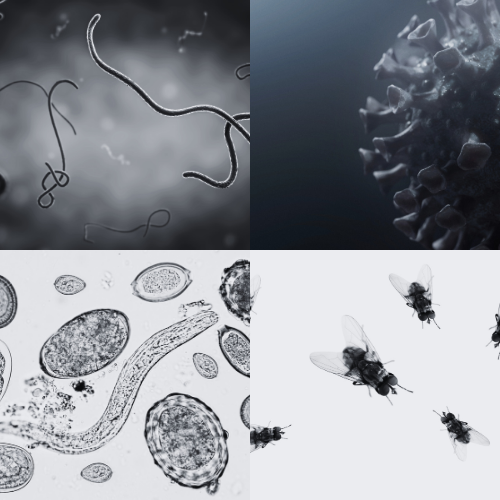When we bring a dog into our lives, we’re not just gaining a pet; we’re welcoming a bundle of joy, a heap of fun, and, inevitably, a bit of mess. Yes, dealing with dog poop is part and parcel of dog ownership, a task as routine as it is unglamorous. But beyond the immediate nose-wrinkling inconvenience lies a less visible but far more serious concern: the potential health risks dog waste poses to humans and other animals. This blog post aims to pull back the curtain on the silent hazards hidden within those unassuming piles left behind on sidewalks, in parks, and around our neighborhoods. By exploring the diseases and illnesses transmitted through dog waste, we hope to underscore the importance of conscientious pet care and community health practices. Let’s dive into the microscopic world of pathogens that could be lurking in your furry friend’s feces, uncovering why scooping that poop is more than just a courtesy—it’s a public health imperative.

The Unseen Threat: Pathogens in Dog Waste
Dog feces are more than just an unsightly nuisance; they can harbor a range of pathogens, including bacteria, viruses, parasites, and fungi, capable of transmitting diseases to humans. The risk of transmission is particularly high in areas where pets and people share close quarters, such as parks, streets, and backyards. Here’s a closer look at the common culprits lurking in dog waste:
1. Parasites: The Hidden Invaders
- Toxocara canis (Roundworms): These parasites are notorious for their resilience. Eggs shed in dog feces can contaminate soil and surfaces for years. Humans, especially children, can ingest these eggs through hand-to-mouth contact after playing in contaminated areas. Infection can lead to toxocariasis, manifesting as fever, coughing, asthma, and even vision loss in severe cases.
- Echinococcus granulosus (Hydatid Worms): This tapeworm’s lifecycle involves dogs as definitive hosts and humans as accidental intermediate hosts. Ingestion of eggs from contaminated dog waste can lead to hydatid disease, characterized by the development of cysts in organs, potentially causing severe health complications.
- Giardia: A protozoan parasite that causes giardiasis, a gastrointestinal illness. Symptoms include diarrhea, abdominal cramps, and dehydration. Both dogs and humans can contract Giardia from contaminated water or soil.
2. Bacteria: Microscopic Menaces
- Campylobacteriosis: Caused by Campylobacter bacteria, this disease is transmitted through contact with contaminated dog feces, leading to diarrhea, abdominal pain, and fever.
- Salmonellosis: Salmonella bacteria, present in some dogs’ feces, can cause severe gastrointestinal issues in humans, including diarrhea, fever, and abdominal cramps.
3. Viruses: Invisible Infectors
- Parvovirus: While canine parvovirus primarily affects dogs, certain strains can pose risks to humans, especially those with weakened immune systems, leading to respiratory or gastrointestinal symptoms.
4. Fungi: Spore-Bearing Spies
- Histoplasmosis: This respiratory illness is caused by the Histoplasma fungus, which can grow in soil enriched with bird and dog feces. Inhalation of spores can lead to symptoms ranging from mild respiratory issues to severe pulmonary disease.
The Role of Responsible Pet Ownership
Mitigating the health risks associated with dog waste requires a concerted effort from dog owners, communities, and local governments. Here are some steps to ensure public health and safety:
- Prompt and Proper Disposal: Always pick up after your pet using biodegradable bags and dispose of waste in designated bins. This simple act significantly reduces the risk of disease transmission. Just Poop Scooping is here to help. We offer one-time and regular dog poop scooping appointments, to keep your yard cleaner and safer for your family and your pets.
- Regular Deworming and Vaccination: Keep your dog’s vaccinations and deworming treatments up to date. This not only protects your pet but also helps prevent the spread of parasites and pathogens to humans.
- Educate and Advocate: Spread awareness about the importance of proper dog waste management within your community. Encouraging responsible pet ownership can have a profound impact on public health.
- Support Clean-Up Initiatives: Participate in or organize community clean-up events in dog-friendly areas. Ensuring these spaces are clean benefits everyone—pets and people alike.
Conclusion
While dogs bring immeasurable joy and companionship into our lives, it’s crucial to recognize the health risks associated with negligent waste management. By understanding the diseases transmitted through dog waste and practicing responsible pet ownership, we can safeguard the health of our communities and ensure that our furry friends continue to be a source of happiness, not harm. Let’s commit to being vigilant stewards of both our pets and our environment, fostering a safe and healthy coexistence for all.

